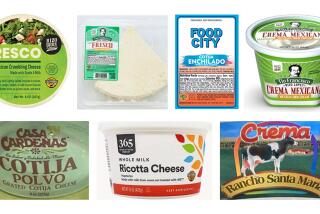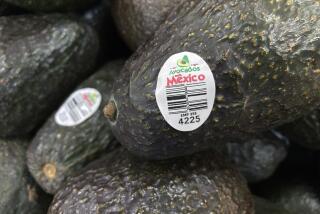Chilean Fruit Back on Produce Stands; Big Chains Waiting for New Shipment
- Share via
Chilean grapes and berries began reappearing in some produce departments Thursday as inspectors cleared the first batches of fresh fruit held in cold storage since the Food and Drug Administration found two cyanide-tainted grapes March 12.
But the Southland’s three largest supermarket chains--Vons, Ralphs and Lucky--said they will pass up the older fruit in favor of fresh supplies aboard the freighter America Rex, as will Stater Bros. The freighter is expected to reach the Port of Los Angeles today or Saturday, having left Valparaiso, Chile, March 14.
The America Rex’s 195,000 cases of grapes, apples, pears and plums will have to go through the same scrutiny as the fruit already ashore, with inspectors checking a 5% sample, or a minimum of 15,000 cases. Nonetheless, most stores expect to be restocked within a week. But as a result, fruit was conspicuous by its absence from most of Thursday’s newspaper grocery ads.
Among the first retailers to restock the once forbidden fruit was Irvine Ranch Farmers Market in Irvine. Produce manager Jose Galvan said customers are buying the grapes, which are labeled by variety--white or black seedless--rather than by place of origin.
“They taste very good, very sweet,” Galvan said. “I had to try them before I put them out. There is nothing to be scared of.”
Nonetheless, shoppers were split on the subject: Some told reporters that the cyanide scare spooked them, while others said it would not stop them from buying grapes in the future. While an elderly shopper shunned grapes, saying, “I’m not a gambler,” Joyce A. Jones of Irvine reasoned that “when they find something in just two grapes, that’s not too much to be concerned about.”
“I would buy them and wash them,” added Katy S. Robbins from Riverside County.
So far, the FDA has only approved inspection procedures for grapes, berries, pears and nectarines. Importers are anxious that inspection procedures be approved for the Granny Smith apples now arriving--apples that they also say are free of the controversial chemical daminozide, marketed in this country as Alar.
The stepped-up inspection procedure is expected to continue through April or until the end of Chile’s fruit exportations, said Tom Boschee, a produce inspector for a major Chilean shipper, David del Curto.
At Christian Salveson Cold Storage in La Habra, one group of newly hired inspectors told a reporter that a colleague had found one nectarine that appeared to have a needle puncture, which prompted an FDA inspector to confiscate the entire crate for lab testing.
So far, importers have been paying the cost of the stepped-up inspections.
Meanwhile, a spokesman for the Chilean winter fruit industry said that with the financial backing of Chile’s government, it is ready to resume exportation under the “unprecedented inspection procedures now operational at all U.S. ports.” Ronald Bown, executive director of the Chilean Exporters’ Assn. in Washington, said Chile will finance the withdrawal of the country’s fruit already in U.S. distribution channels at the time the FDA found the two contaminated grapes in Philadelphia.
Richard Eastes, general manager of David Oppenheimer--California, which imports about a third of the Chilean fruit passing through the ports of Los Angeles and Long Beach, said he welcomes financial help for disposing of recalled or spoiled fruit in storage. But he noted that none of the other importation costs will be covered at this point.
“My crop was shortened,” he said, “but, hey! That’s better than a lot of other scenarios I can think of.”
Times staff writers Mary Ann Galante and Ken Yamada in Orange County contributed to this report.
More to Read
Eat your way across L.A.
Get our weekly Tasting Notes newsletter for reviews, news and more.
You may occasionally receive promotional content from the Los Angeles Times.










